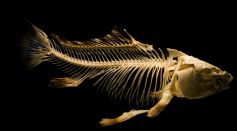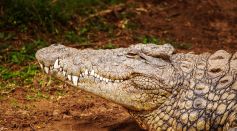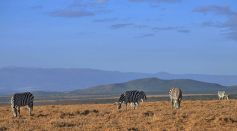Tags: Conservation

Rhino Horns Implanted With Radioactive Isotopes To Poison Those Who Consume It; Would These Efforts Finally Ward Off Poachers?

Sea Otters’ Tool Use Key to Survival Strategy in Monterey Bay, Study Finds

Rarest Insect in the World Makes Comeback: San Diego Zoo Invites Visitors To Witness Extinction-Defying Lord Howe Island Stick Insects

San Diego Zoo Wildlife Alliance and IUCN Launch First Center for Biodiversity Banking to Save Species

AI Tiger Detector? Tiny AI-Powered Camera Developed by Scientists Could Help With Conservation of These Predators, Enable Coexistence With People

Extremely Rare Spotless Giraffe Born at Tennessee's Brights Zoo; Naming Opportunity Sparks Conservation Awareness

Winning Wildlife Photo Features Face-off Between a Sloth and a Dog, Highlights Heartbreaking Conservation Issue

Elephants Learn to Adapt to Varying Landscapes Brought by Increasing Human Development

Wildlife Threatened by Human Activity, New Data Can Boost Conservation Efforts
3D Manta Ray Model Developed to Promote Conservation, Awareness of the Species

Orphaned Baby Manatee in Colombia Rescued in A Swamp in Hopes of Saving It

Phylogenomic Study Corrects Misclassified Black Bass Species Present in More Than 50 Countries

Scientists Use Fish Sounds to Study, Conserve Underwater Ecosystems [Listen]

5-Meter Long Crocodile in Kowanyama 'Humanely Euthanized' for Displaying Aggressive Behavior Despite Potential Icon Status

Wrasse First Thought As Different Fish Species Rediscovered in First-Ever Study in Maldives

UK Signs Deal With Faroe Months After Dolphin Massacre: Conservations Call On European Nations to Cease Whaling Activities

Vacation Photos of Zebras, Whales and Other Animals Can Help Scientists' Conservation Efforts, Fight Wildlife Extinction

Carleton Scientist's Work on Whales Helps Documentary Land an Emmy Award

Ivindo National Park Becomes Second UNESCO World Heritage Site in Gabon, Securing International Support for Conservation

Using Satellite Cameras, Scientists Counted Elephants From Space
Most Popular

Ancient Hotspot Found to Have Created Great Lakes 300 Million Years Ago

Mysterious Structures Discovered Beneath the Pacific Ocean, Puzzle Scientists

Health Benefits of Drinking Hot Chocolate

Largest Known Volcanic Aquifer Discovered Beneath Oregon's Cascades





